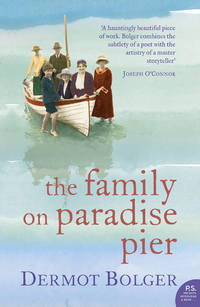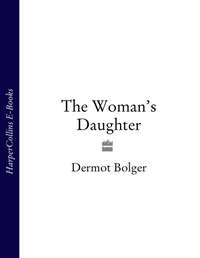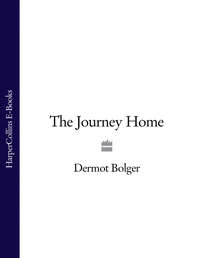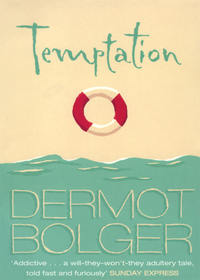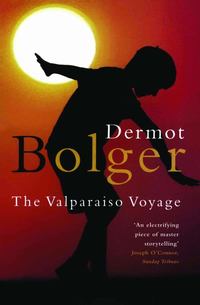
Полная версия
Father’s Music

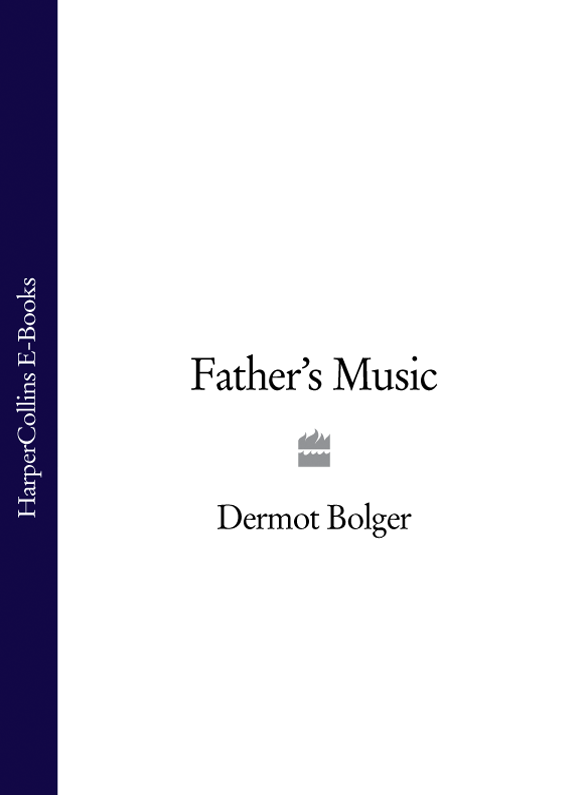
DERMOT BOLGER
Father’s Music

Dedication
IN MEMORY
Johnny Doherty, travelling fiddle-player
from Donegal,
Seamus Ennis, Ard-Rí of Irish pipers
from Finglas, North Dublin
and
Seosamh Ó hEanaí (Joe Heaney),
Sean-nós singer from Connemara,
County Galway.
Contents
Cover
Title Page
Dedication
I: London
One
II
Two
Three
Four
Five
Six
Seven
III: Dublin
Eight
Nine
Ten
Eleven
Twelve
Thirteen
Fourteen
Fifteen
IV: London
Sixteen
Seventeen
Eighteen
Nineteen
V: Donegal
Twenty
Twenty-One
Twenty-Two
Twenty-Three
Twenty-Four
About the Author
Praise
By the Same Author
Copyright
About the Publisher
ONE
MY LOVER LOWERS his headphones over my hair, then enters me. He thrusts stiffly and deep. Irish music swirls into my brain, a bow pressing down across a fiddle, teasing and twisting music from taut strings. My breath comes faster as his hands grip my buttocks, managing to rub his shoulder against the walkman’s volume control. The tune rises, filling me up. I close my eyes so that I can no longer see Luke, just feel his penis arching out and in. The set of reels change and quicken. I listen to a gale blowing across a treeless landscape, see a black huddle of slanted rooftops and drenched cows dreaming of shelter. The beat is inside my head from childhood, imagining an old shoe strike the stone flags and the hush of neighbours gathered in.
Luke pulls my legs higher, positions a pillow under my tensed back. I don’t want to ever open my eyes. The music is so loud and quick it seems sweet torture. It courses through me. I can see his old face playing, that capped man with nicotined teeth and tufts of greying hairs in his nostrils. His eyes are half closed, his breathing laboured. He looks so infirm that he could hardly shuffle across the room, yet his hand flicks the bow back and forth without mercy. He squeezes the wild tune loose, an old master in utter control, coaxing out grace-notes and bending them pitilessly to his will, while the wind howls outside along sheep tracks known only to mountain foxes and to him. He is my peddler father, the wandering lone wolf tinker my mother would never speak of, whose restless soul must now be constrained in some isolated graveyard.
My lover suddenly cries. I know I have drawn blood with my nails against his back. But Luke’s voice is lost beneath the reel spinning faster and faster. And I shout too, no longer caring who hears in that cheap hotel near Edgware Road, with no will left of my own. My voice is just one more note lost in the frenzy of a Donegal gale blowing itself out among the rocks beyond the house where my father once played. Then my scream is suddenly loud, piercing the rush of white noise as the reels halt and I hear my lover come, feeling his final thrusts before I twist the headphones off to look up. The same hairline cracks are on the ceiling. A fly blunders against the damp lampshade, clinging insanely to life in late November.
‘Did you come?’ Luke asks. That’s my own business. I stare back until he looks away.
‘Does your wife like you to fuck her like this? Or is she more the country-and-western kind?’
We lie still after that. Why do I always need to hurt Luke? Is it my way of keeping any threat of tenderness at bay? In four weeks’ time it will be Christmas, with his youngest son waking him before dawn. He gets his store manager to phone the boy from his tile shop every Christmas Eve. Afterwards the child asks, ‘Why does Santa have an Irish accent?’ I am not jealous. I have no wish to make silent phone calls to eavesdrop on their puzzled tones. Luke would bring me somewhere better than this hotel if I asked. But it suits our relationship which started in the tacky Irish Centre across the road, with Luke embarrassed by his family over from Dublin, like overdressed extras in a gangster film, and me fag-hagging there by fluke with a black queen. The only point my mother and Gran seemed united on was that I would never marry an Irishman.
I listen to the Asian family being bed-and-breakfasted by the Council in the next room and think of how the envious bitch of a receptionist gawks at us each Sunday. I arrived early last week. ‘Your friend isn’t here yet,’ she said. ‘He’s not my friend.’ I eyed her coldly, raising my voice. ‘He’s my lover!’
Luke turns towards me, half asleep as always after he comes. Sometimes I claim that he calls me by his wife’s name when he wakes. It frightens him in case he’s doing the same with her. I like it when I can frighten Luke, especially as he scares me so easily. Maybe this edge of fear has held us together for all these weeks, because I know our affair cannot last.
I touch the scar below his left nipple. After all those early fights, this is the only mark on his body. The Canal Wars, he called them. I looked it up once in a book on Irish history. He laughed when I said I couldn’t find it, and spoke of rival gangs of Dublin youths fighting for possession of a canal lock where they could swim among the reeds and rusted prams in their underpants. Luke had been ten, sent out by his big brother Christy to spy on the enemy. A rival gang caught him in a laneway and stripped off his shirt before a ginger haired boy with a deformed hand slashed at Luke’s flesh with a bicycle chain. He came home with blood on his clothes. His mother sat with him in the hospital while the stitches were done. Weeks later an uncle struck him across the face in the street for allowing himself to be caught by anyone.
‘I was never caught again,’ Luke told me once. ‘The best lesson I ever learnt. Fifteen years later I glanced up in the jakes of a pub in Birmingham and recognised that deformed hand. The man grinned sheepishly. “Jaysus, they were great oul days all the same, Mr Duggan.” You couldn’t hate a man who grinned like that. I pulled his jacket over his face so as not to leave scars when I kicked his head in.’
I had liked the way Luke said that, the consideration in his voice. Why bother all those years later, I asked. What could it prove? Luke had shrugged and claimed he’d no choice. It was the least that was expected of him back then. For years Ginger’s fate had hung over him because he always knew he would meet one of the Duggans again. The man would have felt slighted if Luke hadn’t bothered beating him up.
If they met now, Luke claims he wouldn’t touch the man, having escaped from the lure of that family name, but I don’t know if I want to believe him or not. I trace my finger across Luke’s scar. He has had it so long that the stitch marks have faded into his skin. There’s something vaguely delicate about it. His eyes watch me.
‘Why are you always fidgeting with that?’
I close my eyes and see Luke diving from the rotting beams of a Dublin canal lock, his thin, eleven year old body splitting the green water apart. He sinks down, eyes opening in the fading green light. Bottles, reeds and a rusted milk churn. Something catches his ankle and he panics from memory, floundering his way to the surface to spit the oily water out. No boys are left to wage war since the accident. His cheap vest flaps alone under a stone like a flag of surrender.
‘Tell me about the canal again.’
‘No.’
‘Go on, Luke.’
He rises on one elbow. Is he angry or scared?
‘You’re one mad bitch at times,’ he says.
‘Only at times? Go on, tell me about James Kennedy.’
I know he will tell me and he knows that I know. But not for a while yet. The story must be drawn from him. Thirty years later the memory is still raw. Sixteen months ago I watched my mother die in Harrow, but I had been prepared for it, with nurses discreetly waiting in the background and the cleansing scent of disinfectant. Her death had been so prolonged I had grown almost resentful of her. But what must it have been like at eleven to see your best friend drown?
Before then Luke’s brother, Christy, was the gang’s natural leader. But, at twelve, Christy was initiating himself into the stronger currencies of adolescence; the webs of factory skylights, the nods of silent fences, the expanding limits of pubescent girls allowing themselves to be manoeuvred into alleyways. In that vacuum James Kennedy had become the Canal King, the reigning monarch of their childhood who plotted wars and conquests, with Luke happy as his lieutenant.
Somewhere in Luke’s memory it must still be that parched July day, when thirty rival youths were beaten back from the canal lock and James Kennedy’s gang danced on the rotten planks in Y-fronted celebration. They dived repeatedly from the wooden gates, raising a constant spray of foam as dogs shook themselves dry on the tow-path and an old tramp hunched down to watch, sucking on a discarded butt. What madness made Luke dive from so high up on the lock, and what choice had James but to climb even higher? The hush began before James’ body even broken the water, as each boy counted the seconds, waiting for James’ head to re-emerge. Thirteen seconds, fourteen, fifteen. Nobody wanted to admit that something was wrong. Nineteen, twenty, the sudden rush of bodies instinctively diving in.
James was still alive when they gathered around him, his foot caught in the spokes of an old wheel. Lush reeds were twisted round his ankle. Some boys claimed that the reeds were alive, wrapping themselves tightly round James’ shin no matter how often they tried to prise them away. The others were forced to surface for air, while James’ kid brother, Joe, screamed and wet his trousers on the bank. There was only James and Luke left down there, with James’ face turning blue and his eyes curiously calm as if saying; ‘you’re the new king, kiddo, it’s all on your shoulders now’. When the others dived again it was to pull their hands apart and bear Luke up into his new kingdom of barking dogs and sirens under the scorching sun.
Soon Luke will tell me this story again beneath the blankets, his voice cold and emotionless. I’ll feel his penis stiffen and know that afterwards he will turn me on my stomach, his hands merciless as he grasps my hips to drag me back and forth. I will raise my hands to pull the blankets tight, drowning under the blackness we are submerged beneath, as I listen to his hard excited breath and think of how his heart will beat, loud and fast as if scared, in the silence after we have spent.
I open my eyes, surprised that I have slept. I can hear the Asians watching a Star Trek movie. The carpet is threadbare and cold against my feet. I find my tights in the street light coming through the gaps in the blinds, hesitate and then pocket his walkman with the tape. Sean Maguire is the fiddler, he says. I think of Luke in jail that one time in Dublin, slopping out and being ridiculed for listening to bog music like that, with his family name alone protecting him. Luke claims that he has been a legitimate businessman for years now, but he never tells me why he served time and there are things that even I know not to ask.
The hotel room is freezing. I find my skirt and shoes. Luke hates me leaving without waking him. That’s why he has hidden my knickers. He will reach for them beneath the mattress in half an hour’s time, fingering them like some obscure consolation as he imagines me sitting on the swaying tube to Angel, being eyed by black youths in baseball hats. My legs will be crossed as I read the ads for fountain pens and office temps, while in my ears his tape will play like a phantom pain, bringing back all the memories I have never told him about.
The child whom I was once in my grandparents’ house in Harrow seems like a stranger now. By day she would obey her Gran’s clock-work ordinance, but alone at night she would close her eyes to imagine rooftops huddled against a Donegal hillside and neighbours gathering to hear her father play in hamlets and remote glens. I can see her still dancing barefoot, while my mother and Gran argued about her future downstairs. Swaying to tunes she could only imagine and spinning ever faster until, finally, falling on to the bed and gripping the blankets dizzily over her head, she almost believed that his fiddler’s hands were swaying in the shadow of the cherry-blossom branches against her window: my dark father secretly making music for the daughter whose existence he had never bothered to acknowledge.
TWO
THAT SUMMER BEFORE I had met Luke it seemed to be raining incessantly almost every Sunday when I woke. Drab light pervaded my bedsit as I lay on until noon, stranded between dreams and wakening, before dragging myself under the shower down the hallway.
Later, as winter came in, I would resent Luke for becoming the focus of my Sundays. Before I met him they never dragged in that way. I had taken a slovenly delight in them, only bothering to cook myself a leisurely dinner and eat it in my dressing gown before the television when daylight was already teetering in the sky. The payphone on the landing rarely rang on Sundays and I made certain it never rang for me. I lived my real life away from that house of cheap flats in Islington and I recognised the other tenants only by the tread of their footsteps past my door.
Since moving into that flat after my mother’s death, Sunday was the evening when, once a month or so, I allowed men to chat me up. I liked Sunday nights for that and I liked to hunt alone. The weekend was effectively over, with men less on the prowl and less in love with themselves and, on Monday morning, if they were lucky enough (few were and fewer deserved to be) I’d enjoy their predicament in trying to manoeuvre me from their beds in time to make a dash for work. Sometimes, with the more nervous types, I’d sleepily turn over, letting them stew with visions of a ransacked flat on their return and messages scrawled in lipstick for neighbours to read. Once or twice I even stayed on alone, wrapping myself in their bath robes and fingering the details of their lives after they had gone.
I always made sure they had somewhere to go, with proper jobs and nice apartments. I preferred my casual lays to be conventional. Accountants who bleated as they came and grinned uncomfortably when asked if their pure wool pullovers were purchased in Harrods or sheared off their backs by their mammies. Bitch, I heard them mutter in their minds. But they were hooked, calculating the odds and afraid to blow it. They’d rush to the bar to buy stronger drinks, hoping to catch their friends’ eyes and be rewarded with a wink.
Sex seemed easier with people I’d nothing in common with. Their dull lives were exotic really. Ordered men swallowed any lie you threw at them. They scampered off when I finally allowed them to, desperate to brag confidentially about the former nun from Bishop’s Stortford or the Leamington Spa zoologist they had picked up. Perhaps I judged some too harshly. A decent one or two probably bothered to phone the number I gave them and were hurt to find themselves speaking to the answering machine at the Battersea Dogs’ Home.
But if I reserved one life for Sundays, it was on Saturdays that I really had my fun back then, with Roxy and Honor. We toured the clubs, trying to stay together as the E took hold and we threw ourselves into the joyous wave of bodies skewed about in the strobe lights and found each other again when we were washed out the other side. Sometimes there were vans that sped for hours along motorways, crammed full of underdressed girls and lank youths with dandruff and socks that could walk home by themselves.
We always had to stop to allow someone to get sick and stood about, arguing with the spaced out driver who swore blind that he wasn’t lost. When we finally arrived, the raves were never as good as the expectations built up on those journeys. We would find ourselves in a field at dawn with damp grass and sheep shite trampled underfoot. There was a manic blankness in people’s eyes as they danced like their movements were a nervous twitch they couldn’t shake off. Even when their eyes closed as if asleep, their legs wouldn’t stop moving. Music pulsed inside them like an orgasm they couldn’t be released from, the pleasure of which paled and pained but continued on. Finally, when legs shuffled to a halt by themselves, a thirst remained like a purgatory which no Christ in no desert ever endured. By the time the local police arrived, the vans that had brought us there were gone. I hated the journeys where they herded us back to London and I’d finally unlock my flat door, too tired to open a window and release the odour of trapped heat and sour milk.
Those burnt out evenings were to be avoided. That was why Roxy and Honor and I fell out from those dance clubs most Saturday nights before the temptations of vague location maps and offers of lifts were passed around. Sometimes, giggling and swaying about the after-hours streets, we would stumble across a gig in some fire-trap basement club. If the band were inexcusably chronic we’d push our way up to the stage, dancing and screaming our adoration at the acne-scarred singer, puffing him up to more ludicrous posing. We’d cluster at his feet, shouting between songs that we would wait outside for him to take all three of us in the one bed later that night. Rather than fight among ourselves we had decided to share his body.
If the bouncers hadn’t already cottoned on to us, we’d point towards the exit and blow kisses at him, before staggering out to laugh and fall against the shop windows, imagining him rushing to finish the gig. We’d play our favourite game of trying to out-stare the mannequins, shrieking over which shop dummy had winked back first. Then we’d order kebabs in some dingy restaurant, taking turns to trip down to the ladies and put our mouths under the tap. We’d sit, trying to cajole a smile from the sullen waitresses. I was happy there, loved by my friends and loving them back. Nothing could ever come between us. My life in Harrow had vanished and my future would have to wait because the present seemed so immaculate.
But eventually, when chairs were being piled onto the formica tables, we were forced on to the streets again. It would be nearly dawn and we’d stumble into Tower Records where serious night owls with horn-rimmed glasses scoured through the back catalogues of Gerry’s Left Testicle or other punk bands from Papua New Guinea. We never lasted long there before we were thrown out. But sometimes, as the first ache of sobriety turned my stomach sour, I’d find myself flicking through the Irish section. The foreign names were unpronounceable, crammed with Os and Macs and crooked accents. I’d stare at the high cheekbones and bony elongated fingers of old pipers on sepia covers. There was even a tiny section reserved for sean-nós singing: a solitary, indecipherable wailing without any musical backing at all.
My mother once told me that my father, Frank Sweeney, sang as well as played the fiddle. He had reined in his wanderlust long enough to witness my birth before deserting us to return to Ireland. That was all I knew. I rarely thought about him or cared if he might still be alive. But sometimes during those raids on Tower Records I was glad that Roxy and Honor were goading a nerd as I searched in vain for what my mother once told me was his favourite tune, Last Night’s Joy. I’d take the earphones from a listening post and select a disc at random. A grainy dawn would have broken with traffic easing off, leaving only black taxis speeding to catch the lights. I’d close my eyes, listening to the ebb of that impenetrable music and think of my mother dying in Northwick Park Hospital a year before. I didn’t know what those tunes meant, each one sounding the same, only faster. Even their names gave no clue: The Frost is All Over, Jenny Picking Cockles, The Pigeon on the Gate.
They should have conjured up images of hillsides of barley shaken by the wind, or hares bounding through the winter dark as boots crunched ice on potholes along a lane. Instead I saw my mother’s face on a hospital pillow and thought of how I had never heard her listen to that music which, Grandad told me, my father had played in the back bedroom. My father’s music and my mother’s pain. Their daughter’s futile regrets after the bird had flown. The music gave way to white static and suddenly it was Bessie Smith I wanted to hear, her pain resonating in the heavy pausing as she sang, Sometimes I feel like a motherless child.
I should be over her death by now, but too much guilt seemed involved to properly mourn her. I’d listen to the clamour as another reel began, knowing that two hysterical girls were about to grab the headphones and shriek with laughter at what was playing. ‘Now that’s what I call jungle music,’ Honor would mock in her London accent laced with a Jamaican twang. What could I do, except pretend to share their mirth as the guard threw us out and we walked the streets until a taxi was found?
That was how, at six o’clock most Sunday mornings, I’d lean against my bedsit door, knowing the same memories were waiting to entrap me. I would be dejected and hungover, filled with regret for the passing of something I’d never properly known. I’d shut my eyes and see the swings in Cunningham Park in Harrow at dawn that previous August. For once the bowling greens had been without their flock of white-clad pensioners, but a group of teenagers still huddled around a ghetto-blaster, like zombies in a bad B-movie, as I had passed.
I hadn’t even found somewhere private to say goodbye to my mother back then. But there had been no special places for the pair of us, no woodlands where mother and daughter had run through a riot of spring flowers or avenues of autumnal leaves. I hadn’t even the memory of sharing a garden bench with her some summer night when she might have put names on to the scattered map of the stars. Maybe I had blocked such memories out that morning, because her death left a numb sensation. But, throughout her cremation, all I had kept remembering was a swing creaking in Cunningham Park, and my eight year old voice afraid to repeat the questions about whether I’d once had a daddy and where he might be. I could recall pain lining her face as, distractedly, she pushed me higher into the air than it felt safe to go, and the sense of being punished for saying something wrong.
Those swings were broken last August when I had knelt to scatter her ashes on the grass. She had always liked that view sweeping up to the public school on the hill. There was heavy rain forecast. I remember wondering if the teenagers had sat there all night. They finally lifted their heads indifferently to watch me open the urn. What did I expect to happen? That her ashes might dissolve with the dew or there would be a sign she was finally at peace? I felt foolish kneeling there. I rose and looked down. I had no God to pray to and I knew she couldn’t really hear, but inside my head I spoke, if not to her spirit then to the ache she had left behind.


